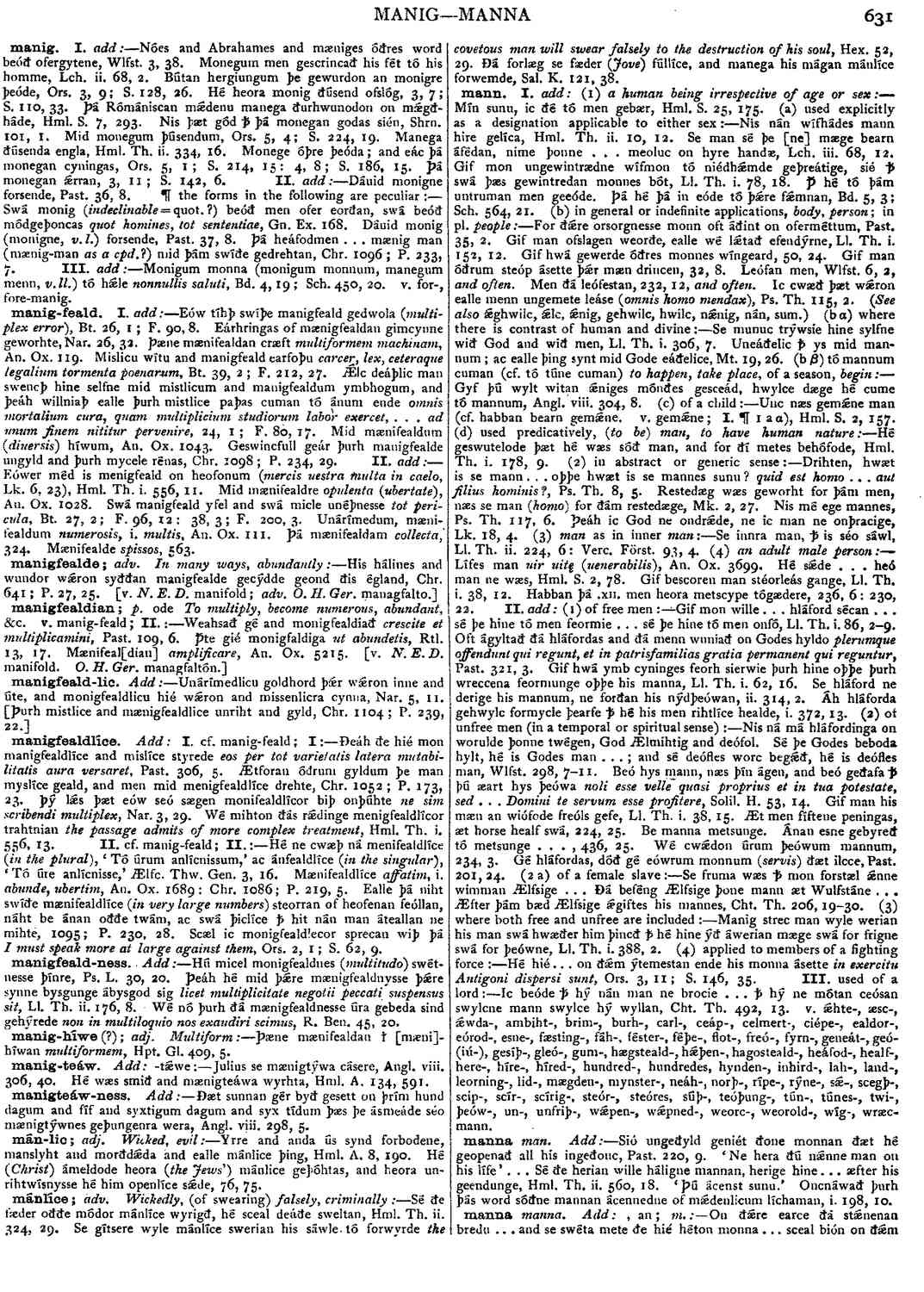mann
-
Mín sunn, ic ðé tó men gebær,
- Hml. S. 25, 175.
-
Nis nán wífhádes mann hire gelíca,
- Hml. Th. ii. 10, 12.
-
Se man sé þe [ne] mæge bearn áfédan, nime þonne . . . meoluc on hyre handæ,
- Lch. iii. 68, 12.
-
Gif mon ungewintrædne wífmon tó niédhǽmde geþreátige, sié ꝥ swá þæs gewintredan monnes bót,
- Ll. Th. i. 78, 18.
-
Ꝥ hé tó þám untruman men geeóde. Þá hé þá in eóde tó þǽre fǽmnan,
- Bd. 5, 3; Sch. 564, 21.
- For ðǽre orsorgnesse monn oft áðint on oferméttum. Past. 35, 2.
-
Gif man ofslagen weorðe, ealle wé lǽtað efendýrne,
- Ll. Th. i. 152, 12.
-
Gif hwá gewerde óðres monnes wíngeard,
- 50, 24.
-
Gif man óðrum steóp ásette þǽr mæn drincen, 32, 8, Leófan men, Wlfst. 6, 2, and often. Men ðá leófestan, 232, 12, and often. Ic cwæð þæt wǽron ealle menn ungemete leáse (omnis homo mendax), Ps. Th. 115, 2. (
See also
ǽghwilc, ǽlc, ǽnig, gehwilc, hwilc, nǽnig, nán, sum. ) (b α) where there is contrast of human and divine :-- Se munuc trýwsie hine sylfne wið God and wið men,- Ll. Th. i. 306, 7.
-
Uneáðelic ꝥ ys mid mannum ; ac ealle þing synt mid Gode eáðelice, Mt. 19, 26. (b β) tó mannum cuman (cf. tó túne cuman) to happen, take place, of a season,
begin
:-- Gyf þú wylt witan ǽniges mónðes gesceád, hwylce dæge hé cume tó mannum,- Angl. viii. 304, 8.
- Unc næs gemǽne man (cf. habban bearn gemǽne. v. gemǽne;
-
Hé geswutelode þæt hé wæs sóð man, and for ðí metes behófode,
- Hml. Th. i. 178, 9.
-
Drihten, hwæt is se mann. , . oþþe hwæt is se mannes sunu ?
quid est homo . . . aut filius hominis ?,
- Ps. Th. 8, 5.
-
Restedæg wæs geworht for þám men, næs se man
(homo)
for ðám restedæge,- Mk. 2, 27.
-
Nis mé ege mannes,
- Ps. Th. 117, 6.
-
Þeáh ic God ne ondrǽde, ne ic man ne onþracige,
- Lk. 18, 4.
-
Se innra man, ꝥ is séo sáwl,
- Ll. Th. ii. 224, 6: Verc. Först. 93, 4.
-
Lífes man
uir uię (uenerabilis),
- An. Ox. 3699.
-
Hé sǽde . . . heó man ne wæs,
- Hml. S. 2, 78.
- Gif bescoren man stéorleás gange. Ll. Th. i. 38, 12.
-
Habban þá . xii. men heora metscype tógædere,
- 236, 6: 230, 22.
-
Gif mon wille . . . hláford sécan . . . sé þe hine tó men feormie . . . se þe hine tó men onfó,
- Ll. Th. i. 86, 2-9.
-
Oft ágyltað ðá hláfordas and ðá menn wuniað on Godes hyldo
plerumque offendunt qui regunt, et in patrisfamilias gratia permanent qui reguntur,
- Past. 321, 3.
-
Gif hwá ymb cyninges feorh sierwie þurh hinc oþþe þurh wreccena feormunge oþþe his manna,
- Ll. Th. i. 62, 16.
- Se hláford ne derige his mannum, ne forðan his nýdþeówan, ii. 314, 2.
- Áh hláforda gehwylc formycle þearfe ꝥ hé his men rihtlíce healde, i. 372, 13.
-
Nis ná má hláfordinga on worulde þonne twégen, God Ælmihtig and deófol. Sé þe Godes beboda hylt, hé is Godes man . . . ; and sé deófles wore begǽð, hé is deófles man,
- Wlfst. 298, 7-11.
-
Beó hys mann, næs þín ágen, and beó geðafa ꝥ þú æart hys þeówa
noli esse velle quasi proprius et in tua potestate, sed . . . Domini te servum esse profitere,
- Solil. H. 53, 14.
-
Gif man his mæn an wiófode freóls gefe,
- Ll. Th. i. 38, 15.
-
Æt men fíftene peningas, æt horse healf swá,
- 224, 25.
-
Be manna metsunge. Ánan esne gebyreð tó metsunge . . . ,
- 436, 25.
-
Wé cwǽdon úrum þeówum mannum,
- 234, 3.
-
Gé hláfordas, dóð gé eówrum monnum (
servis
) ðæt ilcce,- Past. 201, 24. (2a) of a female slave :-- Se
-
Manig strec man wyle werian his man swá hwæðer him þincð ꝥ hé hine ýð áwerian mæge swá for frigne swá for þeówne,
- Ll. Th. i. 388, 2.
-
Hé hié. . . on ðǽm ýtemestan ende his monna ásette
in exercitu Antigoni dispersi sunt,
- Ors. 3, 11; S. 146, 35.
-
Ic beóde ꝥ hý nán man ne brocie . . . ꝥ hý ne mótan ceósan swylcne mann swylce hý wyllan,
- Cht. Th. 492, 13. v.
Bosworth, Joseph. “mann.” In An Anglo-Saxon Dictionary Online, edited by Thomas Northcote Toller, Christ Sean, and Ondřej Tichy. Prague: Faculty of Arts, Charles University, 2014. https://bosworthtoller.com/55111.
Checked: 0